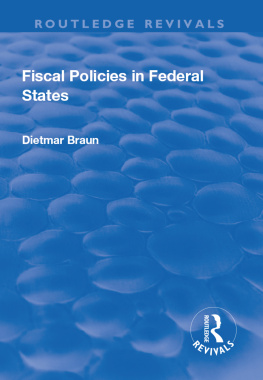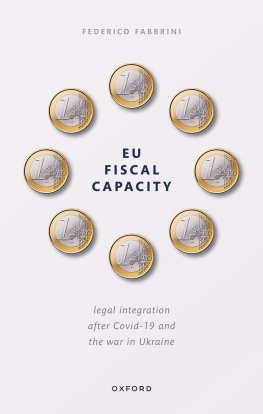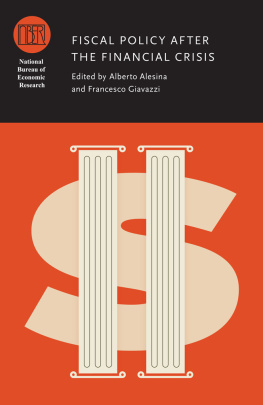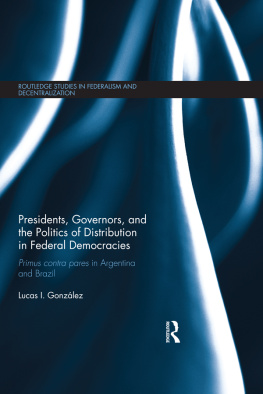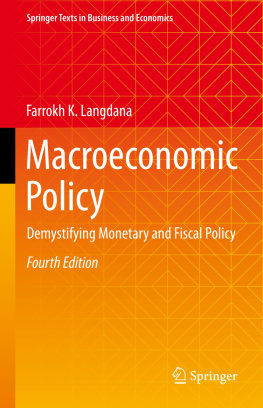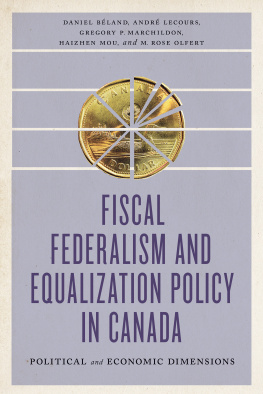FISCAL POLICIES IN FEDERAL STATES
Fiscal Policies in Federal States
DIETMAR BRAUN
University of Lausanne
With:
SONJA WLTI
Georgetown University, Washington
ANNE-BATRICE BULLINGER
University of Lausanne
ROBERT AYRTON
University of Lausanne
First published 2003 by Ashgate Publishing
Reissued 2018 by Routledge
2 Park Square, Milton Park, Abingdon, Oxon OX14 4RN
711 Third Avenue, New York, NY 10017, USA
Routledge is an imprint of the Taylor & Francis Group, an informa business
Copyright Dietmar Braun 2003
Dietmar Braun has asserted his right under the Copyright, Designs and Patents Act, 1988, to be identified as author of this work.
All rights reserved. No part of this book may be reprinted or reproduced or utilised in any form or by any electronic, mechanical, or other means, now known or hereafter invented, including photocopying and recording, or in any information storage or retrieval system, without permission in writing from the publishers.
Notice:
Product or corporate names may be trademarks or registered trademarks, and are used only for identification and explanation without intent to infringe.
Publishers Note
The publisher has gone to great lengths to ensure the quality of this reprint but points out that some imperfections in the original copies may be apparent.
Disclaimer
The publisher has made every effort to trace copyright holders and welcomes correspondence from those they have been unable to contact.
A Library of Congress record exists under LC control number: 2002038376
ISBN 13: 978-1-138-71773-2 (hbk)
ISBN 13: 978-1-315-19595-7 (ebk)
Contents
Dietmar Braun is Professor of Political Science at the Institut dEtudes Politiques et Internationales at the University of Lausanne, Switzerland. His main research interests are in modern political theory, comparative public policy analysis, in particular in the field of research policies, and federalism. He works in particular on the relationship between federalism and public policies.
Sonja Wlti is a postdoctoral fellow of the Swiss National Science Foundation and lecturer at the Georgetown University in Washington, USA. She works in particular on environmental policies and federalism and is an expert on Swiss federalism.
Anne-Batrice Bullinger has worked at the University of Lausanne as a research assistant before she accepted an appointment in the Forum of Federations in Ontario, Canada. Today she is coordinator of interuniversity relationships at the University of Lausanne.
Robert Ayrton has worked at the University of Lausanne as a research assistant and is now a journalist in the field of economic policy. He specialises in the development of Swiss fiscal policies.
This book is the result of a two-year research project financed by the Swiss National Science Foundation (No. 1214-052384.97/1) between 1998 and 2000. I would like to thank the Foundation for its generous financial support and its flexibility in dealing with administrative matters. In addition, the rectorat of the University of Lausanne supported the project by an additional financing in the framework of its programmes prioritaires. I am also very grateful for this support.
Anne-Batrice Bullinger and Sonja Walti have worked since the beginning as research collaborators on this project, Robert Ayrton came in somewhat later. They have done a formidable fieldwork and contributed in many ways to the conceptual development of this book. The outcome was a report prepared in the year 2000, which can be downloaded after contacting me by e-mail. The report gives all methodological details and refers more precisely to the interviews held in the different countries. As all collaborators have left our institute, I have decided to re-write the report on my own. In many ways it has become different but the description of the case studies is still very much based on the contributions of my three collaborators. This is why one should consider this book as a publication, which is under my sole responsibility but which is still based on a collective effort. In particular, Anne-Batrice Bullinger worked on Canada and Belgium, Sonja Walti on Germany and Robert Ayrton on Switzerland. I sincerely appreciate their work. Elena Pibiri has been, as usual, extremely helpful in preparing the camera-ready version of the book.
Last but not least, I would like to thank all persons who have been so kind to respond to our many questions and who have had an immense influence on the stock of knowledge gathered in this book. Without them, the research would have been impossible.
Our interest in the topic of the relationship of federalism and public policy in general has been triggered by two developments in comparative public policy research:
First, one can reasonably argue that the comparative study of federalism is currently going through a revival inspired by neo-institutionalist concerns. Based on numerous contributions concerning the workings of federalism and its implications on policies, scholars of federalism and comparative public policy have become interested in the impact of federal and multilevel structures on policy-making (Banting 1987; Gray 1991; Pierson 1995; Braun 2000; Wachendorfer-Schmidt 2001). The impact of federal institutions may vary depending not only on the prevailing federal configuration in a country but also on the policy field in question.
Second, since the 1990s institutional restrictions on government activities have become a hotly debated explanatory variable for variations in government performance (Schmidt 1996b; Wagschal 1996; Colomer 1995; Immergut 1992; Huber et al., 1993; Tsebelis 1995b). One of the more important findings is that, in view of the spectacular economic success of Great Britain and New Zealand in the 1980s and 1990s, majoritarian democratic regimes seem to be in a much better position to react by radical and innovative policy reforms than those regimes in which the government is bound by a multitude of institutions, for example veto-referenda, independent national banks or our topic federal structures. Those countries having a large number of institutional restrictions such as Switzerland, the USA and Germany seem to have chosen particular options in public policymaking. Schmidt demonstrates that these countries have a slower growth in state expenditures, relatively low inflation rates, and prefer the use of less activist labour market instruments (Schmidt 1996b: 176). Lijphart confirms that consensual democracies being equipped with a large number of institutional veto-points have, despite their difficulties to implement policy choices, a quite favourable policy outcome: though economic growth is in general lower than in majoritarian countries, on most other economic performance indicators consensual democracies fare better. Above all, they contribute to a kinder, gentler democracy in terms of equality, developmental aid and ecological considerations (Lijphart 1999; see also Crepaz 1996; for a contrary view Anderson 2001). Anderson and Guillory find that voters are more satisfied in consensual than in majoritarian democracies (Anderson and Guillory 1997).
One should, therefore, be cautious in judging the effects of institutional constraints: Evidently a high number of institutional veto-points are not conducive to rapt action which might be necessary from times to times to keep up a satisfactory economic, social and democratic performance. On the other hand, most of the studies demonstrate that this does not result in an inferior outcome in terms of performance.

